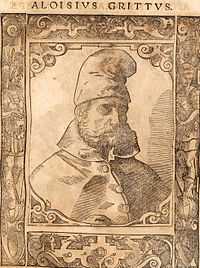Lodovico Gritti

Lodovico Gritti (Constantinople 1480, September 29 - 1534 Medias Medgyes) Aluise Aloysi Luigi Louis Gritti, Ludovico or, as the Venetians called him, Alvise Gritti, and the Hungarians Lajos Gritti. He was influential in the Hungarian Kingdom under the reign of King John I of Hungary. He was also a minister of the Turkish sultan, and regent of Hungary from 1530 to 1534.[1] He was the natural son of Andrea Gritti, the Venetian Bailo in Constantinople during the reign of Sultan Bayezid II, who later became the Doge of Venice in 1523.
Youth
For some years Gritti's father served as the Venetian ambassador at the Ottoman court, so Gritti grew up in Constantinople. Talented, he received his higher education in Venice and Padua (1496-1507/8) and by 1527 was back in Constantinople where had his first interview with Pargalı Ibrahim Pasha, the Grand Vizier for Suleiman the Magnificent (Suleiman I). Gritti won favor with Ibrahim, who entrusted him with great responsibilities, making him a business partner.[2]
Early career
In 1527 Gritti supported King John I of Hungary against Ferdinand I of Habsburg, who wanted the crown for himself. He became soon one of the most important allies of King John and served as ambassador between the monarch and the Turkish sultan. In 1528 the grand vizier, according to reports, planned to take him on the projected campaign into Hungary where Gritti was to get "an important archbishopric plus a piece of the archduchy of Austria once the Turks had taken them." [3] Lodovico stayed in the city of Buda first as King John's advisor, and then between 1530 and 1534 as regent of Hungary.
Attempted Coup
1533 Nov 19 The governor of Marano to Charles V, Holy Roman Emperor. "I heard a few days ago that the Captain-General of Croatia apprehended and sent to (your brother's city of) Lubiana two of Gritti's spies. They have confessed that Gritti, in the name of the Turkish Emperor, has made an alliance with the kings of England and France and also with several other princes against His Imperial and Royal Majesties (Charles and his brother Frederick, then King of Bohemia and the rest of Christendom. In consequence of this the armies of the Turk, consisting of about 1,500 light horse and 22,000 hackbutiers—the whole force to be paid by the king of France—are about to invade Christendom. And it is the opinion of one of the spies that Gritti himself with his confederates will invade Croatia, Slavonia, and Hungary, and try if he can conquer those countries. Meanwhile the dukes of Bavaria and Wurtemberg and the count (landgrave) of Hesse will create disturbances in Germany, and so distress Christendom that His Imperial Majesty will find himself in trouble.[4]
1534 Gritti's attempt to take over Transylvania caused a general uprising but in the end he was killed along with his two sons at the siege of Medias.[5]
References
- ↑ The Papacy and the Levant, Volume 3 (Philadelphia, 1984) by Kenneth M. Setton, p 89
- ↑ Government of the Ottoman Empire in the Time of Suleiman the Magnificent by Albert Lybyer, p 197
- ↑ Sutton, The Papacy and the Levant, Volume 3, p 301
- ↑ Calendar of State Papers, Spain, Volume 4 Part 2: 1531-1533 (1882), pp. 858-868
- ↑ Lybyer, p 62
Further Reading
- Peter G. Bietenholz, Thomas B. Deutscher (2003). Contemporaries of *Erasmus: a biographical register.
- Albert Lybyer (1913). Government of the Ottoman Empire in the Time of Suleiman the Magnificent.
- Ferenc Szakaly (1995). Lodovico Gritti in Hungary: 1529-1534: a historical insight.